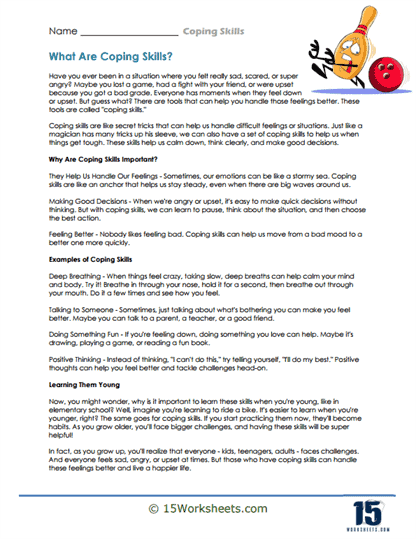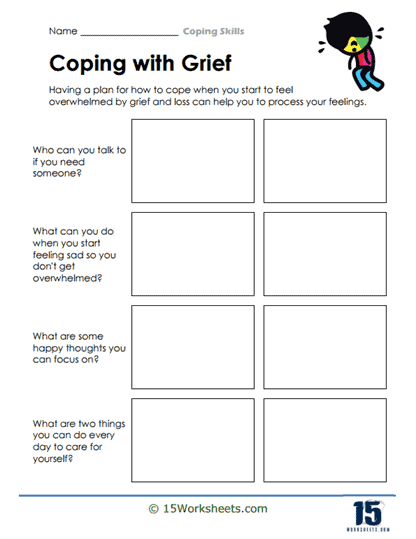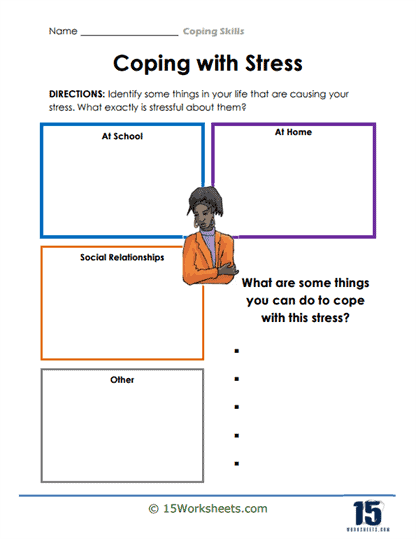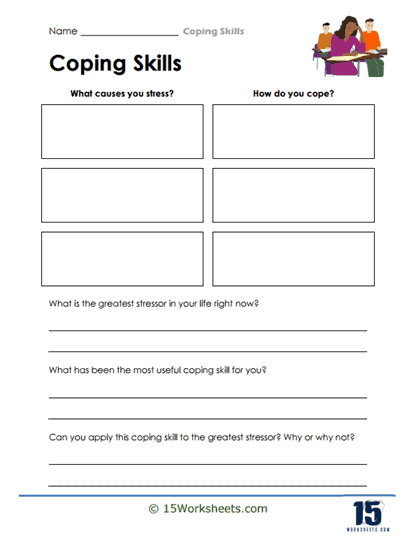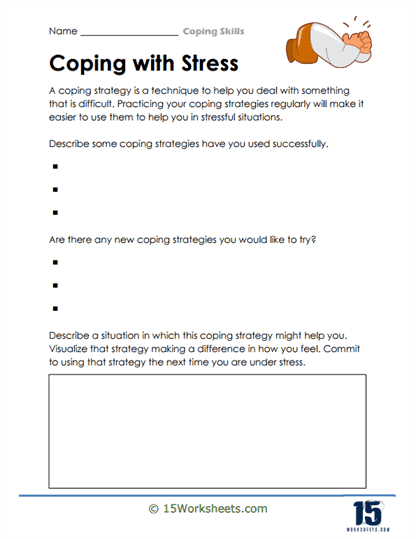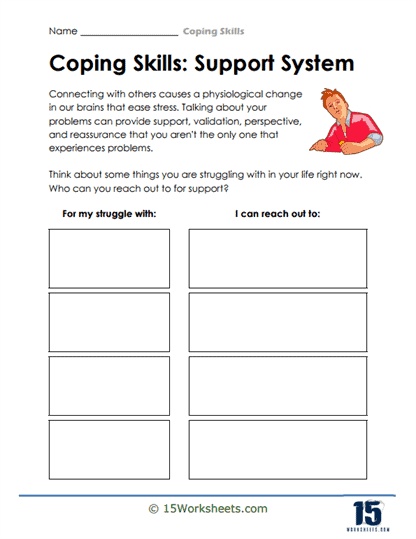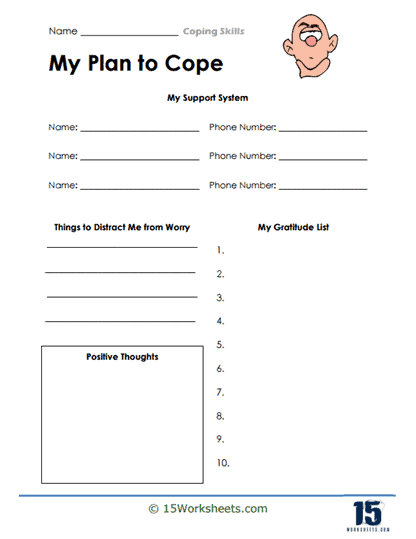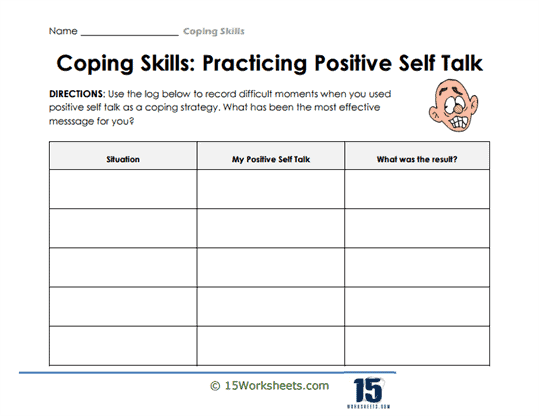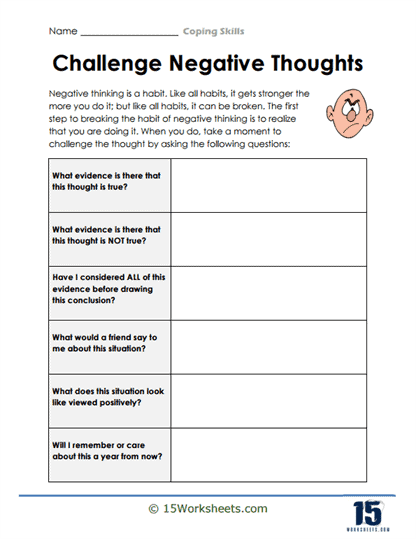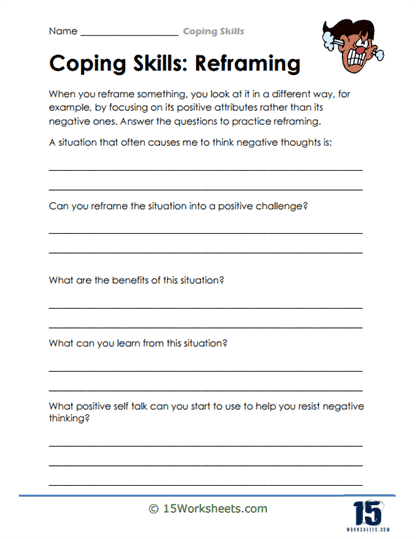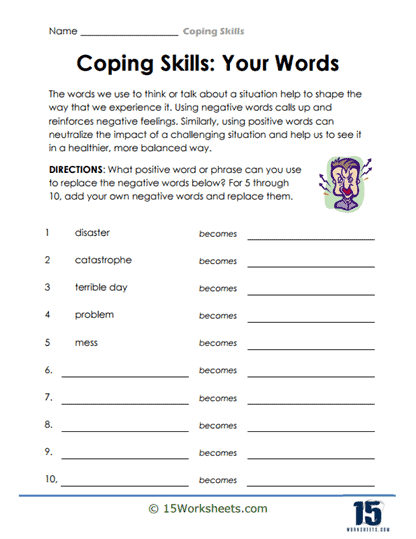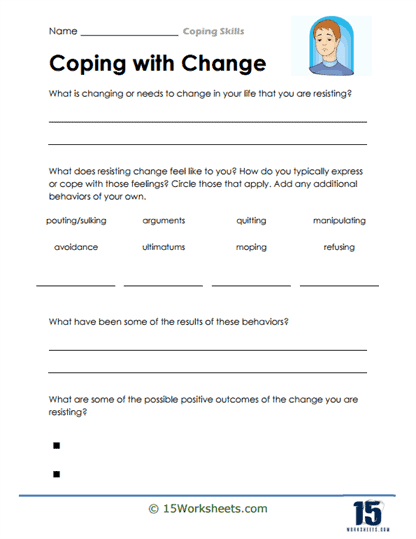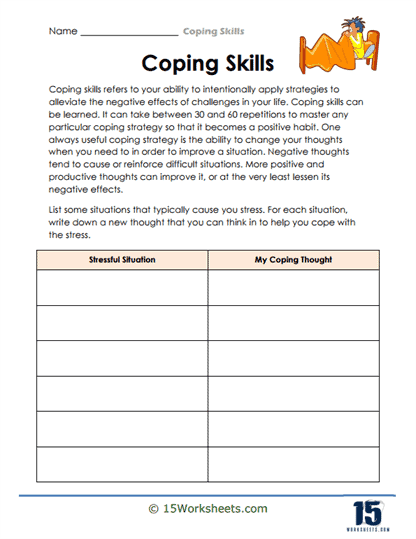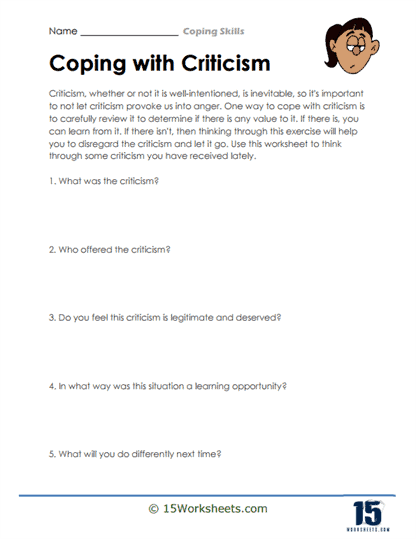Coping Skills Worksheets
About These 15 Worksheets
Imagine, just for a moment, that you had a magical backpack-one that is always by your side, filled with everything you need to handle life’s toughest moments. This isn’t an ordinary backpack, though. It doesn’t carry books or snacks. Instead, it’s brimming with tools and strategies, all designed to help you navigate whatever emotional hurdles come your way. Whenever you’re overwhelmed by stress, sadness, or confusion, you can reach into this backpack and pull out exactly what you need to regain your balance and move forward.
In a way, coping skills worksheets are like the essential building blocks for filling up that emotional backpack. They’re not just pieces of paper with words and exercises. No, they are the blueprints to mastering your emotions, the keys to unlocking a stronger, more resilient version of yourself. Every time you complete one of these worksheets, it’s as if you’re adding a new tool to your arsenal-another strategy that will help you handle stress, manage your feelings, and keep your head held high when life throws challenges your way.
Now, think about superheroes. They don’t just walk into battle unprepared. They have their gadgets and powers to help them face the unknown. Batman has his utility belt, Wonder Woman has her lasso, and Spider-Man has his web shooters. What if you had your own set of emotional tools-something just as powerful, but invisible to the outside world? The truth is, you can be your own superhero, equipped with emotional strength and resilience. Coping skills worksheets are the gadgets in your personal toolkit, helping you understand your emotions and how to respond to them, no matter how intense or unpredictable they might feel.
One of the most important things about these worksheets is that they remind us we are not powerless in the face of difficult emotions. When stress builds up, when anxiety tightens its grip, or when sadness feels all-consuming, it’s easy to feel like you’ve lost control. But imagine if, in those moments, you had the clarity and the tools to step back, assess the situation, and know exactly what to do next. Coping skills worksheets can give you that clarity. They help you break down complex emotions into manageable parts, offering you techniques to deal with each piece individually. Whether it’s deep breathing, mindfulness exercises, or reframing negative thoughts, these strategies allow you to take a proactive role in your emotional well-being, rather than feeling like you’re at the mercy of your feelings.
A Look At the Individual Worksheets
Imagine a classroom where students become emotional superheroes, each armed with an invisible utility belt brimming with coping strategies. The “What Are Coping Skills?” worksheet serves as their origin story, introducing them to the concept of managing emotions effectively. It’s like discovering that deep breathing and positive self-talk are their superpowers, ready to be unleashed when stress strikes.
As they delve deeper, the “Awareness And Solutions” worksheet transforms them into emotional detectives, identifying stressors with the precision of Sherlock Holmes. “Processing Grief” then guides them through the labyrinth of loss, offering a map to navigate the complex terrain of emotions. It’s a journey where tears are not signs of weakness but milestones of healing.
Change is the only constant, and “Handling Changes” equips students with the agility of acrobats, helping them adapt to life’s unpredictable twists and turns. With “Pinpointing Stressors,” they become cartographers of their own emotional landscapes, charting out triggers and learning to steer clear of emotional quicksand. “Identifying Effective Strategies” then hands them a personalized playbook, filled with tactics tailored to their unique challenges.
Visualization becomes their secret weapon in “Visualizing New Techniques,” where they rehearse responses to stress in the theater of their minds. “Strong Support Systems” reminds them that even superheroes need sidekicks, encouraging them to build a network of allies. “Comprehensive Action Plan” is their mission briefing, outlining step-by-step strategies to tackle emotional villains head-on.
Inner dialogue takes center stage in “Positive Self Talk,” teaching students to be their own cheerleaders. “Challenge Negative Thoughts” and “Practicing Reframing” are like cognitive martial arts, flipping negative narratives into empowering mantras. “Replacing Negativity” acts as a mental detox, clearing out the cobwebs of pessimism. “Reducing Resistance” helps them lower their emotional drawbridges, allowing growth and change to enter.
“Thought Restructuring” and “Learning From Criticism” are the finishing schools for these emotional warriors, refining their abilities to adapt and evolve. They learn that feedback is not a foe but a mentor in disguise, guiding them toward self-improvement.
Types of Problems On These Sheets
1. Positive Self-Talk – This activity focuses on the words you tell yourself. Sometimes, we’re our own harshest critics. Positive self-talk teaches you to replace negative thoughts with kind and encouraging ones, boosting your confidence and self-esteem. One of the first exercises you might encounter is learning different ways to breathe. Deep, calm breaths can help you relax and stay focused when you’re feeling anxious or overwhelmed. It’s like a secret tool that helps you find your center.
2. Mindfulness Exercises – Mindfulness is like a magical potion that helps you stay present and calm. You might find exercises where you focus on your senses, noticing the details around you. This practice helps you let go of worries and stay in the moment. Imagine having a toolbox filled with strategies to deal with tough moments. This exercise encourages you to write down different coping skills that work for you, like drawing, reading, or talking to a friend.
3. Expressing Emotions -Sometimes, it’s important to express how you’re feeling. You might find activities where you write or draw your emotions, helping you understand and release what’s inside. These worksheets might present different situations and ask you to come up with solutions. This exercise boosts your problem-solving skills and helps you feel more prepared to face challenges. Gratitude is like a beam of sunlight that brightens your day. You might be asked to write down things you’re thankful for. This practice helps shift your focus to the positive aspects of life.
Why Are Coping Skills Important?
Life can be like a rollercoaster with ups and downs. Coping skills teach you how to bounce back from setbacks and keep moving forward. Just like a tree bends in the wind but doesn’t break, building resilience helps you handle adversity with grace. Emotions are like waves-they can be intense and overwhelming. Coping skills provide you with techniques to manage these emotions, preventing them from taking over and helping you stay calm and in control.
Stress is a part of life, but too much stress can be harmful. Coping skills equip you with tools to manage stress, allowing you to stay balanced even in challenging times. When you’re stressed or overwhelmed, it’s easy to make impulsive decisions. Coping skills help you stay level-headed, enabling you to make thoughtful choices even when under pressure.
Coping skills promote mental well-being. They help you process difficult emotions, reduce anxiety, and develop a positive mindset, contributing to your overall mental health. Coping skills include communication strategies that aid in resolving conflicts peacefully. Learning how to express your thoughts and feelings constructively can lead to healthier relationships.
Remember, every time you work on coping skills, you’re investing in your well-being and future success. Whether it’s practicing mindfulness, expressing emotions, or using positive self-talk, these skills are your compass to navigate the vast sea of life. By nurturing your coping skills, you’re cultivating inner strength and equipping yourself to face life’s challenges with resilience and confidence.

